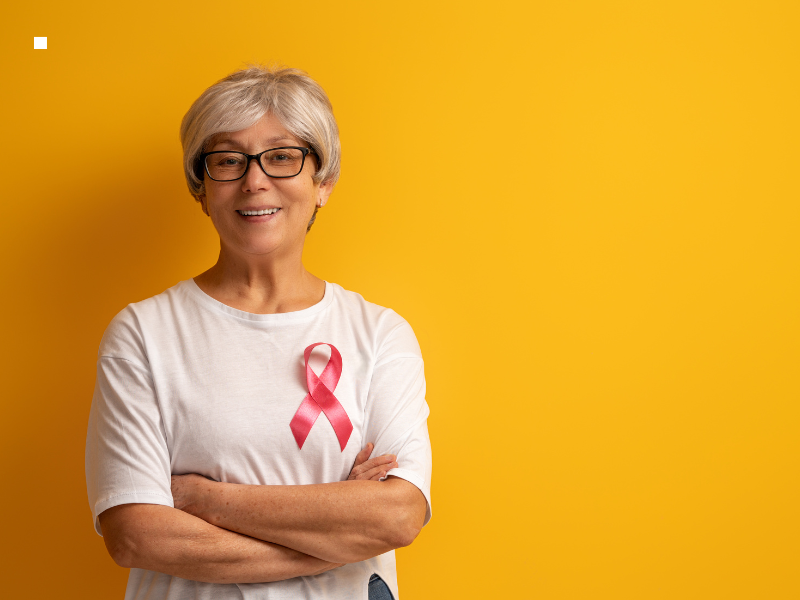Signs, Symptoms, Risks, and Treatment Options for Breast Cancer in Illinois

Author: Home Helpers of Kankakee and Frankfort
Senior Care in Frankfort, Kankakee, IL and Surrounding Areas
One of our elderly female clients at Home Helpers carefully stepped into her caregiver’s car one morning and immediately announced that she had forgotten to put a sock in her bra that morning and hoped no one would notice.
At first glance, the caregiver hadn’t noticed, but our client felt self-conscious since she had undergone a mastectomy due to breast cancer five years ago and the sock helped balance her outward appearance.
Since October is Breast Cancer Awareness Month, I want to review the signs, symptoms, risk factors, and treatment options for breast cancer in Illinois.
Breast cancer is a condition where breast cells become abnormal. As these abnormal cells grow, divide, and create more abnormal cells they become a mass known as a tumor. The best-case scenario is that the tumor is benign, or non-cancerous. If the tumor is found to be malignant, that means it is cancer.
According to the Illinois Department of Public Health (IDPH), “Breast cancer often starts out too small to be felt. As it grows, it can spread throughout the breast or to other parts of the body. This causes serious health problems and can cause death.”
Although every individual is different when it comes to signs and symptoms of breast cancer, the general warning signs are:
- A new lump in or near the breast or under the arm
- A thickening or swelling of part of the breast
- An irritation or dimpling of breast skin
- Redness or flaky skin in the nipple area
- Pulling in of the nipple or pain in the nipple area
- Nipple discharge other than breast milk
- A change in the size or shape of the breast
- Pain in any area of the breast
The risk factors for developing breast cancer include:
- Being female
- Aging
- Family history of breast cancer
- Being older at the birth of a first child or never having a child
- Beginning menstruation before age 12, or completing menopause after age 55
- Drinking alcohol (more than one drink/day)
- Not getting regular exercise
- Being overweight
- Having a personal history of breast cancer or other non-cancerous breast diseases
- Having radiation therapy to the breast/chest
- Using hormone replacement therapy for an extended period of time
- Using birth control medications
IDPH says most breast cancer cases occur in women without any risk factors, meaning everyone should be checked regularly regardless of signs, symptoms, or risks.
“Excluding skin cancer, breast cancer is the most common form of cancer in American women and the second major cause of death after lung cancer. One out of eight women will develop breast cancer over the course of a lifetime,” IDPH explains.
Although there is no way to prevent breast cancer, there are ways to reduce the risk and help increase the odds that if cancer does occur it is found early when it can be more successfully treated. For example, women can reduce their alcohol consumption and stay more active with regular exercise to reduce the risk of getting breast cancer. Another way is to avoid post-menopausal hormone therapy.
Regular mammogram screenings are the most effective way to find and treat breast cancer. Early detection is the key.
Breast cancer treatments can be managed in different ways, depending on the kind of breast cancer and if it has spread. These treatments include surgery, chemotherapy, hormonal therapy, biological therapy, and radiation. People with breast cancer often receive more than one kind of treatment.
IDPH says, “It is common for doctors from different specialties to work together in treating breast cancer. Surgeons are doctors that perform operations. Medical oncologists are doctors that treat cancers with medicines. Radiation oncologists are doctors that treat cancers with radiation.”
If you or someone you know is receiving treatment for breast cancer or is recovering from surgery to remove breast cancer, Home Helpers® Kankakee can provide assistance and support to help make life easier. Our team of compassionate caregivers is highly trained and skilled to help with personal care, homemaking services, grocery shopping, meal preparation, and much more.
I am happy to offer a FREE Assessment to discuss needs and recommend specific in-home care services we can provide to help you or your loved one navigate the challenges that come with breast cancer treatments and recovery.
Home Helpers® Bourbonnais/Kankakee/Frankfort proudly serves male and female seniors in Beecher, Bourbonnais, Bradley, Dwight, Frankfort, Kankakee, Manteno, Mokena, New Lenox, Orland Park, Palos Heights, Palos Hills, Tinley Park, Watseka, Wilmington, and surrounding areas. Contact me today to learn more about the many services offered through Home Helpers® - We are Making Life Easier℠ for you and yours! 815.427.4238
Source:
